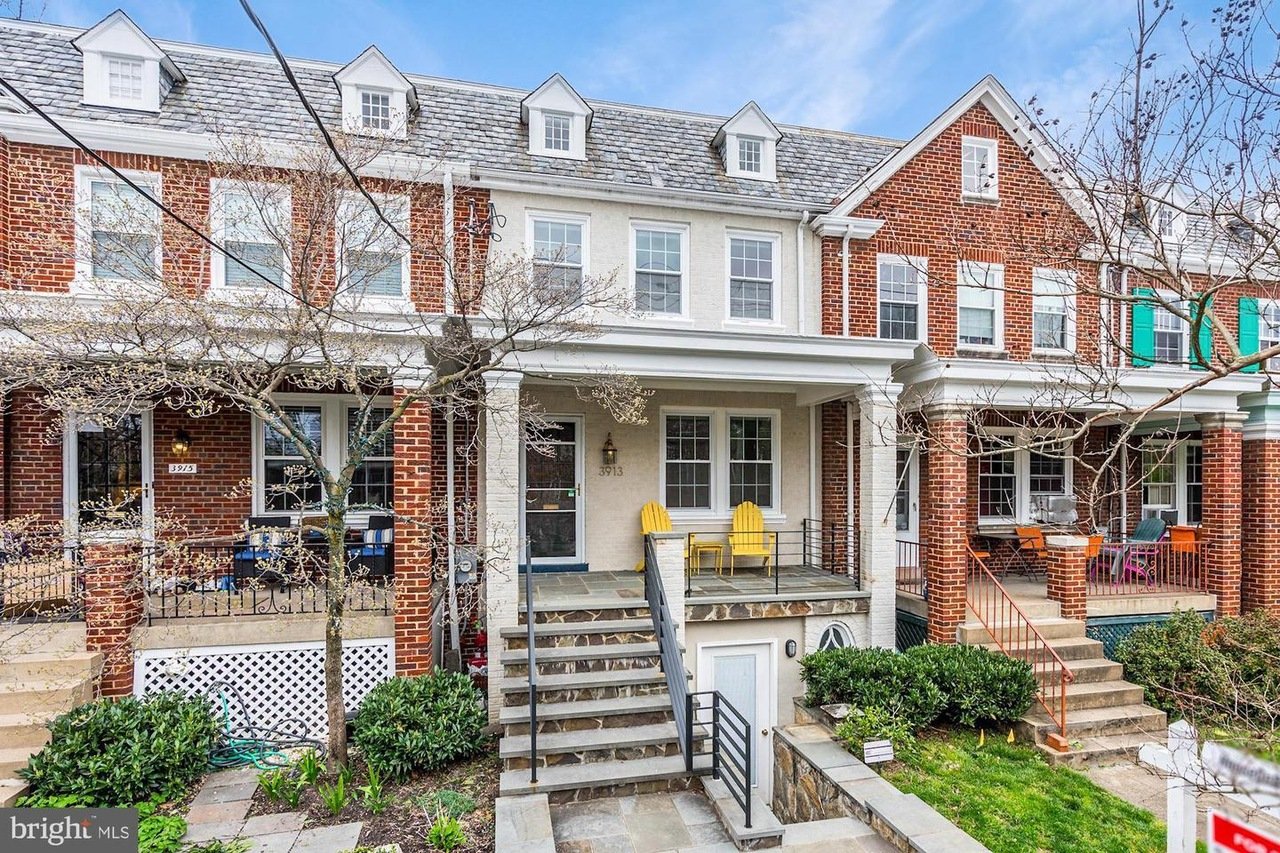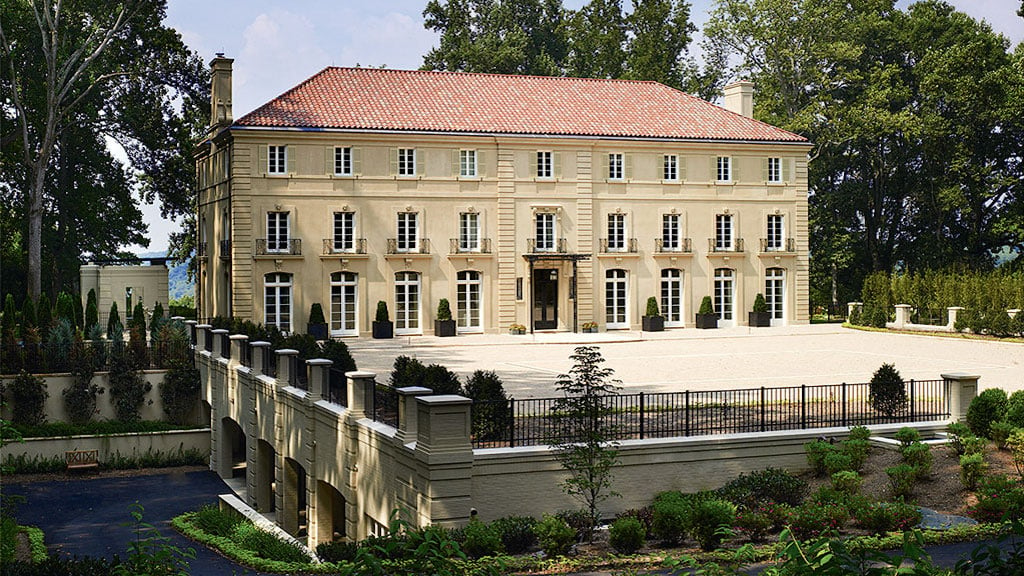Heather Goss, who writes Open House's weekly Diary of a Fixer-Upper column, will host a chat next Wednesday about her renovation. Heather bought a crumbling rowhouse in Columbia Heights in the fall and has spent the last six months gutting and remodeling the home herself. Ask her anything—from how she got financing to what mistakes she's made to where she found her sleek European fridge.
Submit your questions now and Heather will answer them on Wednesday from Noon to 1.
Washington, D.C.
Who was your flooring contractor? I too am restoring a row house. Carolyne
I used Alpha Flooring (240-876-1980), and my initial experience with them was fantastic. They definitely gave me the lowest price, and their workmanship was great — in fact, they were the only ones who wanted to save the scraps of original, hundred year old wood throughout the house, and consolidate it all on the second floor, so I only had to redo the first floor with new wood. Unfortunately when I tried to get a hold of them to patch a section after another project, they really punted, and were so aggravating to get a hold of that I ended up having my general contractors rent some tools and do it themselves. I had heard that Alpha was actually pretty good at small patch jobs, so maybe it was just an off-time for them.
Washington, D.C.
We fully own our home which is in Chevy Chase, DC. It's a 1950's brick colonial that's never been updated so it will require some expensive remodeling I think in the neighborhood of $200,000. We will need to take out a loan for this purpose, and I would like to hear your recommendations on financianing larger home remodeling projects.
There are certainly a lot of options out there for financing a remodeling, though I don't think I'm qualified to speak on them all. I originally financed with an FHA construction loan, which is essentially for properties that aren't up to code, but that's a little different than what you're talking about. Your best bet would be to refinance and pull cash out to put back into the house, but that depends on how much equity you have to start with. You definitely want to get a current appraisal and an estimate of how much your house will be worth after the improvements. Of course, not all improvements are about house value, and you may want to do them for your own benefit regardless of their worth, but in that case it will be difficult or impossible to pay for through refinancing. Also, search around for special or government programs for renovations — there's may be lots of untapped cash and benefits (tax credits, etc.) out there.
Shaw
Hi Heather – I'm interested in knowing why you chose to purchase in Columbia Heights.
I rented in the U Street area for about three years before I decided to purchase, and have really fallen in love with this area of the city. I can walk to so many places (including work — very important), and it's the perfect mix of lively culture and quiet, neighborhoody blocks, so I strictly narrowed my house search from Shaw, north to Petworth. Since I was only looking in neighborhoods I knew I already liked, it really came down to the house itself, and when I visited my house for the first time, I knew it was the whole package: great price point that only needed renovations I could realistically do, and the house was the perfect size for one person starting out, with a small yard and all the other amenities I hoped for. Columbia Heights offered the location I wanted and — lucky for me, the real potential for an upswing in housing prices during the time I live there.
U Street, DC
Heather, what do you think your long-term plans are for your house? Do you plan on trying to make a profit off it in a few years, or do you plan to live there for a long time?
I didn't buy the house just to flip it and run, but yeah, I definitely hope to make a profit it off of it eventually. I don't see myself leaving D.C. anytime soon, but that doesn't necessarily mean I'll own the house for that long. My eventual plan is to sell it and pay off my law school loans, so that I can afford to do more freelance work at some point. I view my renovation experience as mutually beneficial: I get to learn so many things through this process (managerial, financial, and labor skills) and be able to pay off my loan at the end of the day, and at the same time, I feel like I'm helping the city I love by taking an abandoned, broken down, boarded up house where (my neighbors have told me) criminal activity was rampant, and leaving something nice behind if and when I decide to move.
DC
Do you have advice on books or blogs that have helped you throughout the remodeling process?
I did a lot of general searching on the internet initially, and it was helpful to read many different experiences, rather than rely on one source. I will say the Black and Decker Complete Guide to Home Repair has been invaluable for the minor jobs I tackle myself (disasembling faucets to fix, etc). I also use neighborhood blog forums (like at Prince of Petworth) to talk to my neighbors and get their recommendations for good local contractors or local building requirements.
Washington, DC
What is your opinion on keeping and restoring original features such as original window and door trim? Is it more trouble and/or more expensive to restore the old vs. replace with new? How do you think this impacts the resale value of a home?
That can be a tough call. It's great in theory to restore as much as you can — I was thrilled that I could restore at least half of my original hardwood floors, and expose and patch up the old coal stove chimney in the kitchen. But these were both easy fixes (in fact, using the original flooring saved me money), so it really depends on the type of home you have and the quality of the thing you're restoring. I'm no expert in antiques, so if you're really concerned about removing an old part of your home, I would talk to an apprasier who specializes in such things first. It'll probably cost you a few hundred dollars, and they can give you invaluable advice — like that something you thought was original actually isn't, or be able to refer to you contractors who specialize in refurbishing antique pieces.
DC
How much have you spent total on the renovation so far? how much do you expect to spend total?
I haven't added up every last penny, but I've spent in the neighborhood of $35,000 so far. That includes the new heating/cooling system, floors, the new kitchen, and a slew of various smaller projects in the house (drywall, lighting fixtures, etc.). I still need to gut the upstairs bathroom (about $10K) and landscape the yard ($5K), so I'm hoping to stick to a $50,000 budget total. My hope, judging by comparable houses nearby, is that the home is worth in the neighborhood of $400K when I'm finished (I paid $300K).
Arlington, VA
What's been your lowest point during your renovation? Have you ever just wanted to give up completely onthe process?
Honestly, this came just a couple weeks ago. I never had much money growing up, or even in my adult life until the past year or two, so even though in the long run I know I'm investing wisely in the house, I really started to stress out about spending two grand on this and ten grand on that, not to mention my mortgage is double what I used to pay in rent last year. So as the kitchen renovations have been winding to a close, I started to freak out a little, wondering just what I'd gotten myself into. The year before I bought the house, I took unpaid leave and spent a month in India, and that is unfathomable now and into the foreseeable future — so I did have a couple days of angst where I dreamed of selling the house as soon as the kitchen is finished (instead of refinancing), renting a cheap studio somewhere and enjoying all the free time I'd have, not having to meet with contractors every week or decide which faucet I want in the new bathroom. It's really important that I sit down every Sunday to focus, balance my accounts, and make sure that I'm continuing to spend within my means, as well as do my research on refinancing, so that once the renovations are over I'm in a secure place where I can both enjoy my house and start saving money, as well.
DC
I'm deciding between buying a cheap-ish but really rundown house and a somewhat-affordable but brand-new condo…the condo practically talking would probably be easier but I love the idea of a house filled with personality that I worked on. Any advice?
This was the exact dilemma I had. I think I ended up doing a pro/con list, and the condo really lost out. Your money, for one, goes a lot farther with a house — no condo fees, more square footage, a yard. On the other hand, your money buys more space because it's, yeah, run down. But unless a repair is urgent, many of those fixes you can spread out and save up for, and take the time to design exactly as you want. After looking at 10 to 15 condos, I couldn't even separate them in my memory anymore — exact same granite counters, stainless steel appliances…everything with that brand new construction smell (which, unlike with a car, was a turn-off). Don't get me wrong, some were really nice (giant windows!), but they had no character. And personally, I'd been renting a condo where the upstairs neighbors clomped around like eight ton elephants, and really wanted to get away from that on-top-of-each-other situation. If the house is livable enough to move into, giving you time to make repairs, that would be my choice.
Washington DC
Looking back, is there anything you would have done differently? Or are you happy with all of the choices you've made?
To be fair, I've only owned the house for six months, so I probably haven't had enough time to do an honest look back at everything yet. There have been minor details I've been annoyed with later, but nothing significant. If anything, I spend so much time agonizing over small details, that once I've finally chosen a direction I'm always happy with the result, if only because I'm so relieved not to have to think about it anymore. It's more fun (and beneficial to my sanity) to focus on the stuff I've done right (I'm thrilled with the way my kitchen is turning out!), and allow the mistakes to just be something I learn from. Minor ones I put on a list to address once everything else is done. And one benefit, I suppose, of the ongoing renovation, is that there is always something else to focus on. I could agonize over whether I picked the right wood stain, but c'mon, I've got a new dishwasher to pick out!
Washington, DC
My landlord is my roommate, and also a male. His taste in decor has not seemed to mature much as he's gotten older (picture framed band posters covering the walls and furniture that is probably still from his college days). Is there a polite way to suggest we need to spruce up the place?
Ha, that's a tough one. I think your best bet is offering to do the work yourself, like repainting (and asking to take the materials out of your rent check, like any other renter). Maybe you could start subscribing to lots of furniture catalogs and surreptitiously leaving them dogearred around the house. Or go with the old "Oh no! I spilled terrible staining grape juice all over your green corduroy couch! Good thing Macy's is having a sale this weekend — I'll drive."
Washington, DC
I've been reading your columns and it seems like your friends do a lot of stuff for you. I'm hoping to similarliy rope in people to help me out with house stuff…how do you reward them? Or convince them in the first place that helping me is a really great idea!
Luckily I have a handful of handy friends who are generous to begin with — because the ones that don't want to help, you'll never be able to convince otherwise. I always make sure to take them out for a meal (not just pizza) or at least buy them a few rounds of beer later. Some of them have saved me thousands of dollars, and I let them know that. You might say that I work on a barter system with many of them, too, since I have my own ways of being able to help them with whatever they're doing. If you're not already, it pays to be that person that your friends can call with any random problem they have.
DC
So the market seems to be a bit softer now and I'm ready to start the looking-around-to-eventually-buy process. How did you find a good real estate person? What neighborhoods do you think are a good idea to buy in now?
I lucked into my Realtor,
Tom Buerger. My upstairs condo neighbor was selling his place, and I stopped by one day during an open house. Turns out he was using the same Realtor my landlords used to find the place I was renting, and they highly recommended him to me. I was really terrified that everyone in the housing industry was a sleezeball and I was going to have to be on my toes looking for all the ways I was being deceived (my mortgage lender, in fact, was like that), but it seems there are some really good guys out there. It's so important that you work with somebody you're comfortable with; of course they're trying to sell you something, but Tom was pretty honest with me about the type of renovations that were reasonable and which ones really weren't. The best way to find someone is to quiz all your friends and co-workers and see who they recommend (and who they don't). As for neighborhoods, I don't follow in detail the whole D.C. market, comparing neighborhoods to each other, but because we're generally insulated from the nationwide market ups and downs, almost anywhere is a pretty decent place to buy. (I tend to worry about the glut in condos, however, and when I was buying, was worried if they would retain their value.) Be comfortable with the neighborhood first, and you'll likely be just fine.
Petworth
I live in Petworth and have done some small jobs that required cutting into my basement drywall. Can you recommend someone to do patch jobs?
Yes! I've been working with Farfan Home Improvements for all my odd jobs, and they did a fantastic job boxing in my new heating ducts with drywall. They've also helped me put together most of my kitchen, and knew a quality but decently priced plumber to move some pipes, as well. I've been really impressed with their work and their professionalism. You can reach Jeffrey at 703-499-0453.
Also, a note to the questioner above who was deliberating between a condo and a house, I forgot to mention to get a *good* inspection of the house first. The last thing you want is to find out after you close that the entire roof needs to be replaced immediately, when you thought you just had a few cosmetic repairs to do.
Thanks for all your questions! I've had so much fun talking about my experience and learning from those of you who've written to me through the Fixer-Upper column. When I started this process, I quickly learned that talking to as many people as you can is the most important thing you can do. Thanks to the Washingtonian.com for hosting and having me on your chat today.
Join the conversation!
Share









